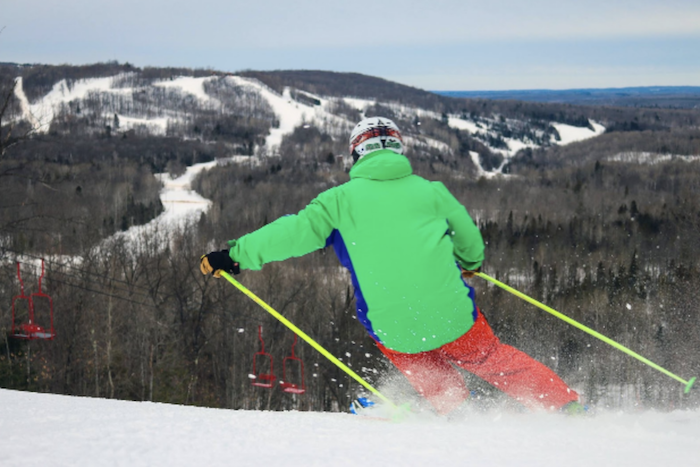By BROOKLYN PEPPO
Capital News Service
LANSING – The ski lift is one of the only socially acceptable places to talk to strangers.
The 10-minute conversations while sitting on freezing metal seats swinging 15 feet above rocky cliffs are my favorite part of the sport.
With goggles and scarves covering faces, identities are a mystery.
But every run down the mountain brings a brief opportunity to meet a friend on the way back up, just like speed dating.
Recently I rode up a chair lift with a man at the Winter Park resort in Colorado. He fell in love with the sport and retired in the mountains to ski. He gave me a full life summary, as one does on a long chairlift up a mountain.
He has a few children and now many grandchildren. It is his mission to share his love of skiing with them. Once they’re old enough. He hopes to teach all of them to ski.
However, he worries that the sport won’t be the same for his young grandchildren. Due to climate change, powder days may be fewer, runs will be limited by less snowfall and shorter seasons.
“The planet could warm by 2.7 degrees Fahrenheit by 2040 if we do nothing to change our current emissions,” according to the Protect Our Winters’ 2020 Annual Report.
Concerns about climate change are universal in the ski community. The sport is impossible without cold temperatures.

Pure Michigan
Skier at Big Snow resort in Wakefield.“Our biggest issue is fighting Mother Nature, you know we can’t make snow with warm temperatures,” said Joe Breighner, the area manager at the Highlands resort in Northern Michigan’s Harbor Springs.
The outdoor sports industry provides great economic benefits.
Protect Our Winters, a nonprofit advocate of pro-climate policy change, reports the industry employs 7.6 million people, creating $887 billion in economic revenue globally. Unfortunately, this industry is extremely vulnerable to weather conditions and climate change has the potential to decimate it, the organization reports.
The Highlands has already been experiencing reduced snowfall over the years, Breighner said. The resort will start investing in new snow-making guns that use innovative technology and run on low energy to produce more snow faster.
Ski resorts must advocate for systematic changes to reduce emissions and slow global warming to plan for their long-term success, said Lora Bodmer , Protect Our Winters’ senior director of media and public relations.
On top of climate change, economic factors are contributing to the decline of accessible skiing. The 2021 International Report on Snow & Mountain Tourism reports a decline in ski areas across the U.S., with 700 ski areas in the 1980s now reduced to 500.
Rising infrastructure costs and increasing client expectations are driving small community ski hills out of business, according to the report.
That makes it harder for beginners to enter the sport.
Skiing is an amazing sport. Anyone of any age can participate. It doesn’t necessarily require athleticism, and it isn’t too difficult to make it down the bunny hill with no experience.
It’s a hobby that I and millions of people across the world enjoy.
Climate change endangers its existence.
Without policy change that reduce fossil fuels emissions, my joy of making friends with a stranger while dangling on the chair lift is threatened.
Future generations, including that man’s grandchildren, will not have the same experience.
Brooklyn Peppo is a reporter for Great Lakes Echo